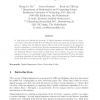Free Online Productivity Tools
i2Speak
i2Symbol
i2OCR
iTex2Img
iWeb2Print
iWeb2Shot
i2Type
iPdf2Split
iPdf2Merge
i2Bopomofo
i2Arabic
i2Style
i2Image
i2PDF
iLatex2Rtf
Sci2ools
110
click to vote
DCC
2003
IEEE
2003
IEEE
On the Security of Digital Signature Schemes Based on Error-Correcting Codes
In this paper we discuss the security of digital signature schemes based on error? correcting codes. Several attacks to the Xinmei scheme are surveyed, and some reasons given to explain why the Xinmei scheme failed, such as the linearity of the signature and the redundancy of public keys. Another weakness is found in the Alabbadi?Wicker scheme, which results in a universal forgery attack against it. This attack shows that the Alabbadi?Wicker scheme fails to implement the necessary property of a digital signature scheme: it is infeasible to find a false signature algorithm D from the public verification algorithm E such that E(D (m)) = m for all messages m. Further analysis shows that this new weakness also applies to the Xinmei scheme.
Computer Graphics | DCC 2003 | Digital Signature Scheme | False Signature Algorithm | Xinmei Scheme |
Related Content
| Added | 25 Dec 2009 |
| Updated | 25 Dec 2009 |
| Type | Conference |
| Year | 2003 |
| Where | DCC |
| Authors | Sheng-Bo Xu, Jeroen Doumen, Henk C. A. van Tilborg |
Comments (0)

